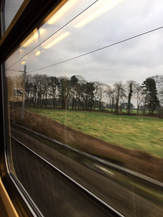
"The real voyage of discovery," said Marcel Proust, "consists not in seeking new landscapes, but in having new eyes."
I love this idea, but I don't agree. The voyage out and the ability to see anew are lock and key to discovery.
I was a twenty-two year old grad student the first time I lived in Britain, a has-been collegiate athlete who’d spent as much time on a basketball court as in a classroom and I was conscious of the deliberate shift the move demanded. No basketball, no family within five thousand miles, no idea, beyond a desire to write, what I wanted to do. I had come not only to discover another county but to discover someone I didn’t yet know well - an old, casual acquaintance whose charms I ignored except for a few flirtations, but who had, in the last several years, become bolder, more insistent and talkative. I met her in Wales, where for the first time unfettered by dreams of athletic success, I fell in love with this other self.
It’s a funny thing falling in love with your self, or rather with aspects, which in the company of people who’ve known you since infancy, remain folded safely away. In Wales, I could not say, “I am a basketball player.” The sport had little credence in that country. Women played net ball, a variation of the game that prohibits dribbling, and from what I could tell, jumping. Nor could I yet say, “I am a writer.” I was a traveler, a student, and girded by those flimsy definitions, the walls of my identity loosened, allowed other incantations to wander and explore.
This trip is different. This time I am married with a child. I’ve published books, and will be deep in another while I'm here. My identity and obligations trail behind like a cape sewn into the skin, but is comfortable for all that. Now, when I travel this country I'm looking through three sets of eyes: my husband’s, who grew up here and for whom every corner holds memories; through my son’s who at four assumes all new things to be ordinary because everything in his life is new. Children are tourists in their own lives, viewing the world with wary and shameless wonder. And of course I look still through a foreigner's eyes, with guarded wonder, marking every difference as a reflection of who I am or might be.
I love this idea, but I don't agree. The voyage out and the ability to see anew are lock and key to discovery.
I was a twenty-two year old grad student the first time I lived in Britain, a has-been collegiate athlete who’d spent as much time on a basketball court as in a classroom and I was conscious of the deliberate shift the move demanded. No basketball, no family within five thousand miles, no idea, beyond a desire to write, what I wanted to do. I had come not only to discover another county but to discover someone I didn’t yet know well - an old, casual acquaintance whose charms I ignored except for a few flirtations, but who had, in the last several years, become bolder, more insistent and talkative. I met her in Wales, where for the first time unfettered by dreams of athletic success, I fell in love with this other self.
It’s a funny thing falling in love with your self, or rather with aspects, which in the company of people who’ve known you since infancy, remain folded safely away. In Wales, I could not say, “I am a basketball player.” The sport had little credence in that country. Women played net ball, a variation of the game that prohibits dribbling, and from what I could tell, jumping. Nor could I yet say, “I am a writer.” I was a traveler, a student, and girded by those flimsy definitions, the walls of my identity loosened, allowed other incantations to wander and explore.
This trip is different. This time I am married with a child. I’ve published books, and will be deep in another while I'm here. My identity and obligations trail behind like a cape sewn into the skin, but is comfortable for all that. Now, when I travel this country I'm looking through three sets of eyes: my husband’s, who grew up here and for whom every corner holds memories; through my son’s who at four assumes all new things to be ordinary because everything in his life is new. Children are tourists in their own lives, viewing the world with wary and shameless wonder. And of course I look still through a foreigner's eyes, with guarded wonder, marking every difference as a reflection of who I am or might be.
 RSS Feed
RSS Feed
